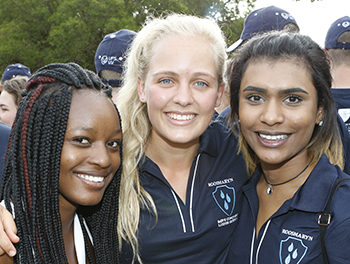
First-year students from the University of the Free State (UFS) recently attended the welcoming ceremony at the Red Square of the Bloemfontein Campus.
Photo: Johan Roux |
The University of the Free State (UFS) does not train Kovsies to become great in Bloemfontein or even South Africa. The UFS trains them to become great in the world.
With these words, Prof Jonathan Jansen welcomed the first-year class of 2016 to the “home of Wayde van Niekerk, Rolene Strauss, and the 2015 Varsity Cup rugby champions”.
Prof Jansen, Vice-Chancellor and Rector of the UFS, welcomed the newcomers to the start of the “best time of their lives” on 15 January 2016 at the Red Square of the Bloemfontein Campus. First-years and their parents attended the annual welcoming ceremony.
Prof Jansen congratulated the students on choosing the UFS, and on being part of the elite group that was selected to study at the university.
The UFS received 25 142 applications from newcomers, he said, although there are only about 8 000 places. In 2015, there were roughly 17 500 applications.
He said it was also the most diverse group of applications the UFS had ever received.
Access to education
According to Prof Jansen, the UFS is committed to helping poor students gain access to education, no matter what their background or the colour of their skin.
Lindokuhle Ntuli, the UFS Student Representative Council (SRC) President, said higher education should be more accessible. He said South Africa has allowed education to become commercialised.
“The sooner we as a country realise education isn’t an expense, but rather an investment, the better,” he said.
UFS campaigns
Prof Jansen thanked the UFS SRC for the Right to Learn (R2L) campaign. Launched by the SRC on 30 October 2015, this campaign has already raised R1.2 million to help academically-deserving underprivileged students to study.
“I have launched a campaign myself to raise R100 million between now and September. About 50% of my time will go into this,” Prof Jansen said.
“I will work tirelessly with Lindokuhle and the SRC to raise money.”